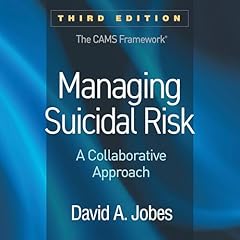
Why People Die by Suicide
No se pudo agregar al carrito
Add to Cart failed.
Error al Agregar a Lista de Deseos.
Error al eliminar de la lista de deseos.
Error al añadir a tu biblioteca
Error al seguir el podcast
Error al dejar de seguir el podcast
 Exclusivo para miembros Prime: ¿Nuevo en Audible? Obtén 2 audiolibros gratis con tu prueba.
Exclusivo para miembros Prime: ¿Nuevo en Audible? Obtén 2 audiolibros gratis con tu prueba.Compra ahora por $20.70
-
Narrado por:
-
Timothy Andrés Pabon
-
De:
-
Thomas Joiner
In the wake of a suicide, the most troubling questions are the most difficult to answer: How could we have known? What could we have done? And always: Why? Written by a clinical psychologist whose own life has been touched by suicide, this book offers the clearest account ever given of why some people choose to die.
Drawing on clinical and epidemiological evidence, as well as personal experience, Thomas Joiner brings a comprehensive understanding to seemingly incomprehensible behavior. Among the many people who have considered, attempted, or died by suicide, he finds three factors that mark those most at risk of death: the feeling of being a burden on loved ones; the sense of isolation; and, chillingly, the learned ability to hurt oneself. Joiner tests his theory against diverse facts taken from clinical anecdotes, history, literature, popular culture, anthropology, epidemiology, genetics, and neurobiology—facts about suicide rates among men and women; white and African-American men; anorexics, athletes, prostitutes, and physicians; members of cults, sports fans, and citizens of nations in crisis. The result is the most coherent and persuasive explanation ever given of why and how people overcome life's strongest instinct, self-preservation. Joiner's is a work that makes sense of the bewildering array of statistics and stories surrounding suicidal behavior.
©2005 The President and Fellows of Harvard College (P)2025 Tantor MediaLos oyentes también disfrutaron:




















Las personas que vieron esto también vieron:












Potentially Life Saving
Se ha producido un error. Vuelve a intentarlo dentro de unos minutos.
This is an essential book for loved ones of persons seriously struggling with their mental health. Joiner illuminates critical behavior and expressions that will alert family members, friends, co-workers, therapists, and others about a person’s suicidal risk.
I have learned, the hard way, that each of us has an important role to play in suicide prevention. We must look after one another. Trust your instincts. Do so when you sense someone you know needs to be checked on. DO NOT WAIT! Make that call or drop by to see them.
You may never know if you saved a life. I know. I am a survivor. MAKE THAT CALL AND DO NOT ACCEPT, “I’M FINE,” as a response to your question asking them how they are doing. Ask the question again differently, such as, “What is the last thing you did for fun?”
Stay engaged. Be genuine. Do not be judgmental. Listen. Encourage them and, if necessary, help them see a mental health professional. A person seriously struggling, often in silence, with their mental health is the least likely person to help themselves. Folks like us need you, and if not you, then WHO?
When Jooner first wrote this book in 2005, 30,000 Americans were dying each year by suicide. In 2025, 50,000 Americans will die from suicide, or one every 11 minutes. Suicide and its devastating, long-lasting effects on survivors of loved ones who died by suicide are an ever-increasing public health crisis hiding in plain sight.
Educate yourself, pay attention to friends and family, trust your instincts, and act when you know you should.
THE SEMINAL BOOK ON SUICIDE
Se ha producido un error. Vuelve a intentarlo dentro de unos minutos.


